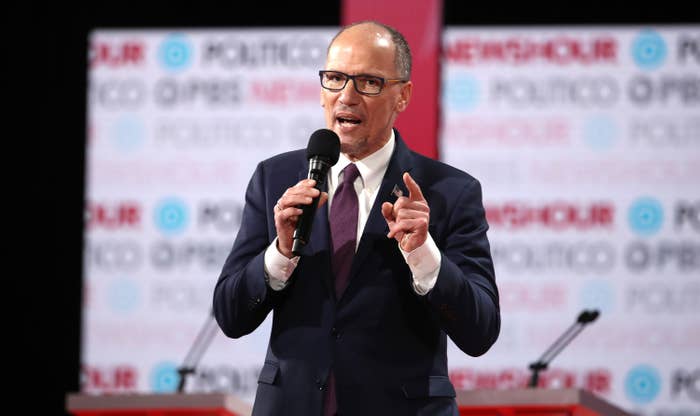
A group of Democratic National Committee officials approved and then withheld from their own leadership a proposal to carve out a generous exit package for the party chair, Tom Perez, and two top lieutenants, leaving Democrats confounded over the weekend by the optics and timing of the decision on the eve of the presidential primary.
The proposal, put forward as an official DNC resolution during a meeting of the party’s budget and finance committee last Friday, would have arranged for Perez and two of his top deputies, CEO Seema Nanda and deputy CEO Sam Cornale, to each receive a lump-sum bonus equaling four months’ salary within two weeks of the time they eventually leave their roles.
Senior DNC officers, including members of Perez’s own executive committee, learned of the compensation package after its approval, through the rumor mill, setting off a furious exchange of emails and texts over the weekend to determine what had been proposed, and by whom.
After BuzzFeed News inquired about the proposal late on Monday evening, Perez told DNC officers in an email that he, Nanda, and Cornale would not accept any “extra compensation” when they leave their posts.
Perez has said he will serve a four-year term as chair through the end of the 2020 election. Nanda and Cornale have worked closely with Perez for years, including at the Department of Labor during Barack Obama’s presidency — though the structure at the DNC could see changes this summer when Democrats choose a nominee during the party’s national convention, at which point the winning campaign typically subsumes staff management of the DNC.
Perez, Nanda, and Cornale have denied having any prior involvement in or knowledge of the resolution.
“One-hundred percent of our resources are going towards beating Donald Trump,” said DNC communications director Xochitl Hinojosa. “DNC leadership will not accept any extra compensation recommended by the budget committee, which didn’t operate at the direction of DNC leadership. The resolution was crafted by the budget committee and did not involve the Chair, CEO, or Deputy CEO.”
Two members of the DNC’s budget and finance committee, Daniel Halpern and Chris Korge, took responsibility for the resolution, describing it as the initial step in a larger plan to prepare for a “smooth transition” between Perez’s tenure and the incoming chair after the 2020 election.
In interviews earlier this week, Halpern and Korge both defended the resolution as above-board and a common business practice, even as Perez distanced himself from the effort, saying he would not accept the money.
After the measure had been approved on Friday, at least two DNC officers heard about and requested copies of the resolution and did not receive a response. On Saturday, at a meeting of the DNC executive committee, which is the top governing body of the party, members of the DNC budget and finance committee did not disclose the resolution. In his email to DNC officers on Monday night, Perez asked that “we hold off sending around the resolution,” according to a copy of the message. In an interview on Tuesday, Halpern declined to provide the resolution to BuzzFeed News. “There was nothing done that was clandestine or nefarious,” Halpern said.
According to the text of the resolution, which one DNC official read aloud in a phone call, the proposal emphasizes the importance of a “smooth transition” between the current DNC leadership and the next, including providing “compensation for certain key outgoing personnel.”
The resolution, which only applies to the 2021 transition, states that the outgoing chair, CEO, and deputy CEO will help facilitate donor and “stakeholder” relations, and convey “institutional knowledge” to the next chair, but is less specific about the requirements of the transition than the details of the compensation package: a lump sum of four months’ pay, paid within two weeks, unless either Perez, Nanda, or Cornale is terminated for “gross misconduct.”
On Tuesday, Halpern said the resolution was meant to serve only as a “nonbinding” starting point to ensure “continuity” between Perez’s tenure and the next party chair.
Outside the party’s budget and finance committee, DNC leadership who spoke on the condition of anonymity said they were astounded to learn that on the eve of the presidential primary, and at a time when the Democratic Party is facing a tremendous fundraising deficit, plans were being made to propose a generous compensation package for Perez and such a select group of his top deputies.
“I think it is completely short-sighted and really stupid,” one senior official said.
Other members of the DNC senior staff have still not seen the resolution and had no knowledge of the resolution until reached for comment late on Monday night.
Based on the committee’s recent monthly filings, the resolution would have arranged for an estimated post-tax lump-sum payment of about $69,000 to Perez, $61,000 to Nanda, and $39,000 to Cornale. Those figures don’t include taxes, which would also come out of the DNC budget.
Since the Obama years, the DNC has struggled with fundraising, routinely lagging behind their counterparts at the RNC. And as Democrats have given millions directly to candidates and to outside groups focused on elections in the era of Donald Trump, the situation has not significantly improved. Perez himself, an intended unity candidate for a thankless job backed by Obama allies, has not always been a unifying figure in practice. But he’s argued the complaints aren’t taken in proper perspective.
"For every booer," he said in 2017, there are hundreds more "who want the party to succeed, have frustrations, and want to make sure that somebody is listening to them."

